
Johann Gottlieb Fichte was a German philosopher who became a founding figure of the philosophical movement known as German idealism, which developed from the theoretical and ethical writings of Immanuel Kant. Recently, philosophers and scholars have begun to appreciate Fichte as an important philosopher in his own right due to his original insights into the nature of self-consciousness or self-awareness. Fichte was also the originator of thesis–antithesis–synthesis, an idea that is often erroneously attributed to Hegel. Like Descartes and Kant before him, Fichte was motivated by the problem of subjectivity and consciousness. Fichte also wrote works of political philosophy; he has a reputation as one of the fathers of German nationalism.
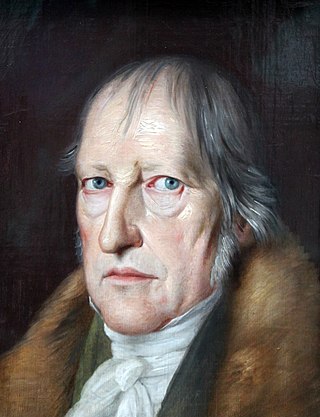
Georg Wilhelm Friedrich Hegel was a German philosopher and one of the most influential figures of German idealism and 19th-century philosophy. His influence extends across the entire range of contemporary philosophical topics, from metaphysical issues in epistemology and ontology, to political philosophy, the philosophy of history, philosophy of art, philosophy of religion, and the history of philosophy.
Idealism in philosophy, also known as philosophical idealism or metaphysical idealism, is the set of metaphysical perspectives asserting that, most fundamentally, reality is equivalent to mind, spirit, or consciousness; that reality is entirely a mental construct; or that ideas are the highest type of reality or have the greatest claim to being considered "real". Because there are different types of idealism, it is difficult to define the term uniformly.

Victor Cousin was a French philosopher. He was the founder of "eclecticism", a briefly influential school of French philosophy that combined elements of German idealism and Scottish Common Sense Realism. As the administrator of public instruction for over a decade, Cousin also had an important influence on French educational policy.
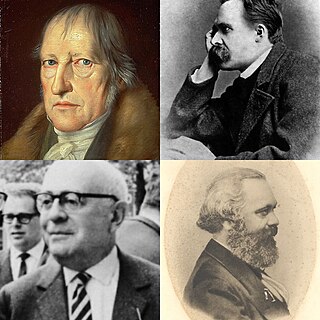
German philosophy, meaning philosophy in the German language or philosophy by German people, in its diversity, is fundamental for both the analytic and continental traditions. It covers figures such as Gottfried Wilhelm Leibniz, Immanuel Kant, Georg Wilhelm Friedrich Hegel, Karl Marx, Friedrich Nietzsche, Martin Heidegger, Ludwig Wittgenstein, the Vienna Circle, and the Frankfurt School, who now count among the most famous and studied philosophers of all time. They are central to major philosophical movements such as rationalism, German idealism, Romanticism, dialectical materialism, existentialism, phenomenology, hermeneutics, logical positivism, and critical theory. The Danish philosopher Søren Kierkegaard is often also included in surveys of German philosophy due to his extensive engagement with German thinkers.

Friedrich Wilhelm Joseph Schelling, later von Schelling, was a German philosopher. Standard histories of philosophy make him the midpoint in the development of German idealism, situating him between Johann Gottlieb Fichte, his mentor in his early years, and Georg Wilhelm Friedrich Hegel, his one-time university roommate, early friend, and later rival. Interpreting Schelling's philosophy is regarded as difficult because of its evolving nature.

Thomas Hill Green, known as T. H. Green, was an English philosopher, political radical and temperance reformer, and a member of the British idealism movement. Like all the British idealists, Green was influenced by the metaphysical historicism of G. W. F. Hegel. He was one of the thinkers behind the philosophy of social liberalism.

The categorical imperative is the central philosophical concept in the deontological moral philosophy of Immanuel Kant. Introduced in Kant's 1785 Groundwork of the Metaphysics of Morals, it is a way of evaluating motivations for action. It is best known in its original formulation: "Act only according to that maxim whereby you can at the same time will that it should become a universal law."
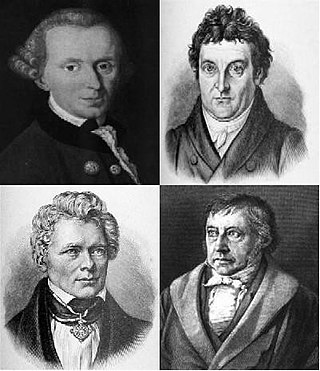
German idealism is a philosophical movement that emerged in Germany in the late 18th and early 19th centuries. It developed out of the work of Immanuel Kant in the 1780s and 1790s, and was closely linked both with Romanticism and the revolutionary politics of the Enlightenment. The period of German idealism after Kant is also known as post-Kantian idealism or simply post-Kantianism. One scheme divides German idealists into transcendental idealists, associated with Kant and Fichte, and absolute idealists, associated with Schelling and Hegel.

Groundwork of the Metaphysics of Morals is the first of Immanuel Kant's mature works on moral philosophy and the first of his trilogy of major works on ethics alongside the Critique of Practical Reason and The Metaphysics of Morals. It remains one of the most influential in the field. Kant conceives his investigation as a work of foundational ethics—one that clears the ground for future research by explaining the core concepts and principles of moral theory, and showing that they are normative for rational agents.

The Critique of Pure Reason is a book by the German philosopher Immanuel Kant, in which the author seeks to determine the limits and scope of metaphysics. Also referred to as Kant's "First Critique", it was followed by his Critique of Practical Reason (1788) and Critique of Judgment (1790). In the preface to the first edition, Kant explains that by a "critique of pure reason" he means a critique "of the faculty of reason in general, in respect of all knowledge after which it may strive independently of all experience" and that he aims to decide on "the possibility or impossibility of metaphysics". In this context, a "critique" means a systematic analysis, rather than finding fault, unlike the term's colloquial use.
The harm principle holds that the actions of individuals should be limited only to prevent harm to other individuals. John Stuart Mill articulated the principle in the 1859 essay On Liberty, where he argued that "The only purpose for which power can be rightfully exercised over any member of a civilized community, against his will, is to prevent harm to others." An equivalent was earlier stated in France's Declaration of the Rights of Man and of the Citizen of 1789 as, "Liberty consists in the freedom to do everything which injures no one else; hence the exercise of the natural rights of each man has no limits except those which assure to the other members of the society the enjoyment of the same rights. These limits can only be determined by law." It finds earlier expression in Thomas Jefferson's 1785 "Notes on the State of Virginia," Query 17 (Religion) in which he writes, "The legitimate powers of government extend to such acts only as are injurious to others."
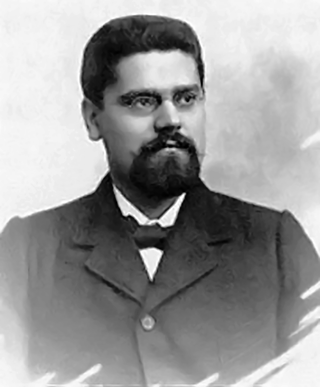
Actual idealism is a form of idealism, developed by Giovanni Gentile, that grew into a "grounded" idealism, contrasting the transcendental idealism of Immanuel Kant, and the absolute idealism of G. W. F. Hegel. To Gentile, who considered himself the "philosopher of fascism" while simultaneously describing himself as liberal and socialist, actualism was presented the sole remedy to philosophically preserving free agency, by making the act of thinking self-creative and, therefore, without any contingency and not in the potency of any other fact.

Absolute idealism is chiefly associated with Friedrich Schelling and G. W. F. Hegel, both of whom were German idealist philosophers in the 19th century. The label has also been attached to others such as Josiah Royce, an American philosopher who was greatly influenced by Hegel's work, and the British idealists.
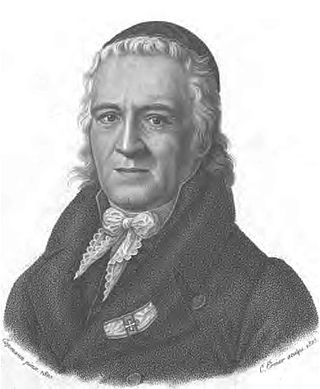
Karl Leonhard Reinhold was an Austrian philosopher who helped to popularise the work of Immanuel Kant in the late 18th century. His "elementary philosophy" (Elementarphilosophie) also influenced German idealism, notably Johann Gottlieb Fichte, as a critical system grounded in a fundamental first principle.
A mental state, or a mental property, is a state of mind of a person. Mental states comprise a diverse class, including perception, pain/pleasure experience, belief, desire, intention, emotion, and memory. There is controversy concerning the exact definition of the term. According to epistemic approaches, the essential mark of mental states is that their subject has privileged epistemic access while others can only infer their existence from outward signs. Consciousness-based approaches hold that all mental states are either conscious themselves or stand in the right relation to conscious states. Intentionality-based approaches, on the other hand, see the power of minds to refer to objects and represent the world as the mark of the mental. According to functionalist approaches, mental states are defined in terms of their role in the causal network independent of their intrinsic properties. Some philosophers deny all the aforementioned approaches by holding that the term "mental" refers to a cluster of loosely related ideas without an underlying unifying feature shared by all. Various overlapping classifications of mental states have been proposed. Important distinctions group mental phenomena together according to whether they are sensory, propositional, intentional, conscious or occurrent. Sensory states involve sense impressions like visual perceptions or bodily pains. Propositional attitudes, like beliefs and desires, are relations a subject has to a proposition. The characteristic of intentional states is that they refer to or are about objects or states of affairs. Conscious states are part of the phenomenal experience while occurrent states are causally efficacious within the owner's mind, with or without consciousness. An influential classification of mental states is due to Franz Brentano, who argues that there are only three basic kinds: presentations, judgments, and phenomena of love and hate.

The lord–bondsman dialectic is a famous passage in Georg Wilhelm Friedrich Hegel's The Phenomenology of Spirit. It is widely considered a key element in Hegel's philosophical system, and it has heavily influenced many subsequent philosophers.
Aenesidemus is a German book published anonymously by Professor Gottlob Ernst Schulze of Helmstedt in 1792. Schulze attempted to refute the principles that Karl Leonhard Reinhold established in support of Immanuel Kant's Critique of Pure Reason (1781). The title is a reference to Aenesidemus, an ancient Greek Pyrrhonist philosopher. Its complete title, in English translation, was Aenesidemus or Concerning the Foundations of the Philosophy of the Elements Issued by Professor Reinhold in Jena Together with a Defense of Skepticism against the Pretensions of the Critique of Reason.
Allen William Wood is an American philosopher specializing in the work of Immanuel Kant and German Idealism, with particular interests in ethics and social philosophy. One of the world's foremost Kant scholars, he is the Ruth Norman Halls professor of philosophy at Indiana University, Ward W. and Priscilla B. Woods Professor, emeritus, at Stanford University, and before that a professor at Cornell University across parts of four decades. He has also held professorships and visiting appointments at several other universities in the United States and Europe. In addition to popularising and clarifying the ethical thought of Kant, Wood has also mounted arguments against the validity of trolley problems in moral philosophy.
Vidya figures prominently in all texts pertaining to Indian philosophy – meaning science, learning, knowledge, and scholarship. Most importantly, it refers to valid knowledge, which cannot be contradicted, and true knowledge, which is the intuitively-gained knowledge of the self. Vidya is not mere intellectual knowledge, for the Vedas demand understanding.